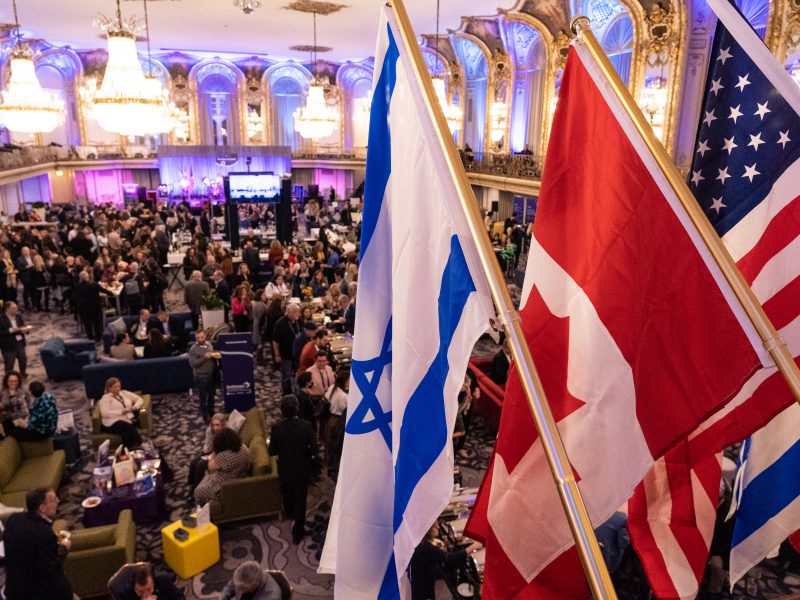Danielle V. Minson — Raising the Bar

The State of Jewish America
I’ve just come back from the “GA,” or General Assembly, organized by the Jewish Federations of North America (JFNA). Over 1,200 leaders from across the North American Jewish community attended our national organization’s first in-person meeting in three years, October 30 to November 1, in Chicago. The GA is considered the most consequential gathering of the leadership of the North American Jewish community.
I’d like to tell you what I learned and some takeaways.
From a bird’s eye view, the Jewish community in the US and Canada is living in complex times. Three issues rose to the top at this conference. First, as you know, antisemitic incidents and anti-Israel rhetoric are increasing at an alarming rate. Secondly, Ukraine is volatile, with Jewish organizations across the US and internationally working hard to support the millions of refugees displaced by the crisis. Third, the changing demographics in the Jewish world means we need to change too. Thinking especially about engagement, this includes balancing supporting legacy organizations including our JCCs and congregations with supporting engagement outside these institutions; issues of diversity such as interfaith, Jews of Color, LGBTQ people; and the increasing variety of Jewish expression and identity; and mental health issues.
In the past I’ve come away from the GA inspired; this time I left Chicago feeling the positivity of having been back in person, but also the heaviness of the issues.
I’m proud to say that our Cincinnati community has already identified and is already engaging with these three national areas of concern.
For today I’d like to focus on antisemitism. The unexpected increase in antisemitism made this cause a priority of our community’s Cincinnati 2030 strategic plan. Last August we invited nationally recognized Project Shema in to lead a set of three workshops on how best to have conversations on antisemitism and anti-Zionism in and with the American progressive movement. These were so successful, with significant increases in willingness to engage in these conversations and high levels of perceived value, per the feedback, that we are planning to have Project Shema return in the near future. One participant said it was “the most important workshop that I have attended.”
As was said again and again at the GA, we must skate to where the puck will be. In other words, we must do o9ur best to understand the future. In Cincinnati our community leadership has started skating. We’re a good team, working collaboratively with a fierce determination to support and strengthen our community. We are finding new ways to gather data and do data assessment to measure outcomes—as was also deemed important in Chicago. I am confident we will hit the pucks into the goals we set.
Having conceptualized our desired future, Cincinnati 2030 is now in its next phase. Our community is moving forward, with the Federation as convener, planner, and what is called in social science literature a backbone organization—a coordinating body that brings together a diversity of stakeholders and leads a synchronized effort to achieve a common goal. Along with the Jewish Foundation of Cincinnati and the successor groups to the Cincinnati 2030 Steering Committee, such as the Aging Services group, we are trying new ideas and new funding mechanisms. (Here are the new Cincinnati 2030-specific funding efforts by Federation.)
It is an exciting time, and I look forward to what we will accomplish by the time 2030 arrives. I want you to know that Cincinnati will be on the cutting edge throughout, and should maintain its reputation of “punching above its weight class.” I am thankful for everyone who has brought us to this point, and is working hard to get us to the next level.
I am also thankful because it’s only two days until Thanksgiving. During this time for giving thanks, I want to take a moment, despite the weight of complex problems, to give thanks for the health of our Jewish communities across America, Israel, and the world. I want to give thanks for all the good being done to help Ukrainian and Russian refugees. And I want to give thanks for you, our Jewish community in Cincinnati.
I hope that your Thanksgiving is warm and filled with a sense of belonging.
PS: Here’s some more GA news if you’re interested. This article that suggests that the “JFNA General Assembly has become the most important and central conference of the organized American Jewish community.” The GA’s sessions are also viewable on YouTube.
PPS: Giving Tuesday, where the world leaves all the Black Friday and Cyber Monday sales behind to focus on generosity, is November 29. You are a partner in all the good work we do here and around the world: Please consider a gift as we move forward, together. Thank you.
Thanks for caring about our community and what we do.
Stay connected: sign up for our newsletter here.

